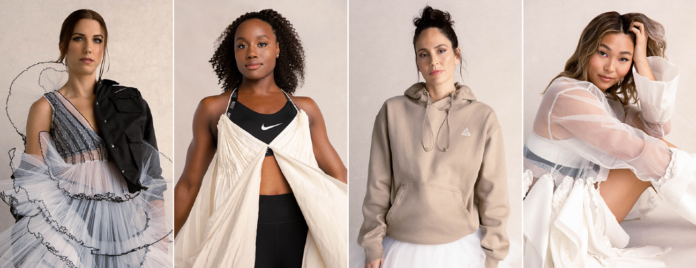Launched in March 2021, Santa Monica-based sports and culture platform AXM, which operates as Togethxr, was created by soccer player Alex Morgan, snowboarder Chloe Kim, swimmer Simone Manuel and basketball player Sue Bird to highlight the achievements of female athletes and advocate for other media companies to do the same.
Togethxr was first conceived in 2019 in the wake of Morgan’s FIFA World Cup victory as a member of the U.S. women’s national soccer team. As an accomplished athlete, children’s book author, occasional actor, brand spokeswoman and then-new mother, she looked at the legacy she was preparing to leave for her life and career and decided all of those achievements were somehow still not enough.
“I think for her, and especially looking at the women that she stands next to every day and fights alongside every single day for pay equity, among many other things, she wanted to build something that existed exclusively for those women, but more importantly for the women who are coming up in the world behind her,” Togethxr Chief Content Officer Jessica Robertson said.
While Morgan has received more media attention than many female athletes, she observed the conspicuous differences between coverage of men’s and women’s sports. A 30-year study conducted by USC and Purdue University, for example, found that in 2019, men’s sports received about 96% of all sports news coverage on television, despite women being more than 40% of all sports participants.
“That’s not even dissecting the quality of that coverage,” Robertson said. “If you only have 4% visibility, it’s incredibly hard to grow the community and the audience and the fan base.”
Meanwhile, a report issued in December by accounting firm Deloitte indicated women’s sports are on track to surpass $1 billion globally in TV and sponsorship revenue “in the years ahead” — a fraction of the $481 billion the industry as a whole reached in 2018 although that second figure includes events like the Olympics and tennis Grand Slam events where female athletes bring significant value. Quoting media executives and industry consultants, the Washington Post reported on Deloitte’s data, attributing this disparity less to actual interest or value for events like the women’s college basketball tournament than to a failure by organizations like the National Collegiate Athletic Association to maximize revenues.
Morgan decided she would not wait for someone to invest in women’s sports, so she reached out to Bird, Kim and Manuel to build something “impactful and undeniable.”
Gathering a mid-seven-figure seed investment, according to the company, the quartet hired Robertson — a former director of content for MTV, executive editor at Fader and head of content for Derek Jeter’s sports-based media platform Players’ Tribune — to build Togethxr as a contrast and competitor to media companies like Barstool Sports Inc., GQ and Complex Media Inc. The women-led sports and culture-based platform, they said, is driven by the company’s “three C’s”: content, community and commerce.
Revenue drivers
Revenue drivers
“It was actually a great time to pause and ask ourselves the big questions that you would want time to answer,” she said.
“The brand itself always had ambition to be inspirational and about authenticity and lived experiences and reflective of our community, but after a lot of the cultural reckonings and conversations that have happened in the last two years, Togethxr understands that there is no neutral anymore.”
Embracing its responsibilities for activism and advocacy, the company has expanded its staff to 10, employing a creative team to program original short-form content through what Robertson called Togethxr’s “social firehose,” followed up by frequent comments, direct messages and other interactions, not just to engage and entertain its community of followers but to refine the company’s brand identity and plan for the future.
Its strategy has worked well so far, attracting 1.1 million followers on social media platform TikTok, as well as about 10,000 members of an “inner circle” its team interacts with frequently to spotlight individually or learn what topics the predominantly female group cares about.
Other ventures include “mid-form” documentary-style episodic content broadcast on the company’s YouTube channel, which drives brand partnerships and revenue, and what Robertson called “premium and prestige products,” which include narrative podcasts and long-form documentaries and series.
Finally, Togethxr has just begun its efforts to create merchandise around the brand with a collection of “dad hats” and hoodies that it aims to build into a more strategic revenue line.
Although the company declined to provide detailed numbers, Robertson said Togethxr has almost tripled its revenue projections for its first year of operations and is aiming for even higher numbers in 2022. Additionally, she shared that the conversion rate for sales on the company’s ecommerce store hovers at around 30%, meaning 30 out of 100 visitors typically buy merchandise — an amount that wildly outpaces Statista’s projected 2021 average of 2.7% for general apparel — which Robertson takes as an indication that their brand is resonating.
Moving the goal posts
Moving the goal posts
“I think ownership is the next frontier for women,” Robertson said.
Going forward, the company hopes to expand into live events and experiential activations around important sports tentpoles.
Despite being born out of sports, Togethxr eventually aims to be a broader culture brand as its leadership eyes media companies like Reese Witherspoon’s Hello Sunshine, which the actress sold earlier this year for more than $900 million, as forerunners for the path it hopes to follow.
Robertson admitted she’s “probably more optimistic than she ever has been” about the company’s future, buoyed by even small indicators of Togethxr’s impact, such as a community member’s decision to tattoo the platform’s logo on her arm. But, whether the company achieves a similar level of permanence, women’s sports is already a cultural fixture, and the media merely need to recognize it, she said.
“I don’t actually think women’s sports has been behind,” Robertson said. “I just think that culture is finally catching up.”

